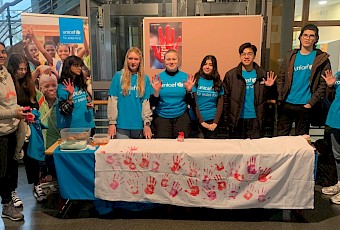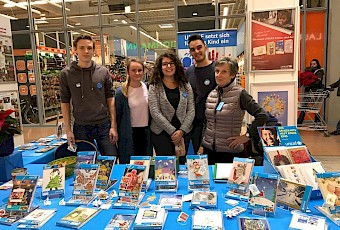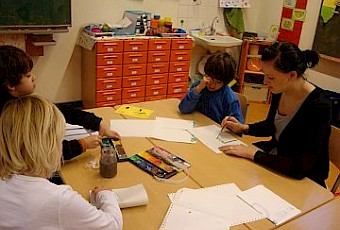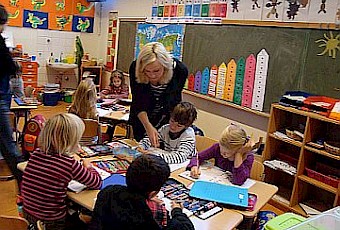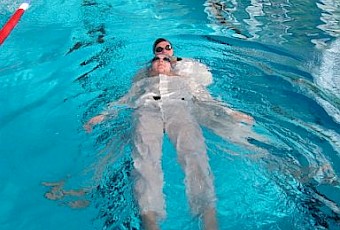Creativity, Activity, Service (CAS)
What is CAS?
Together with TOK and the Extended Essay, CAS - Creativity, Activity, Service - is at the heart of the Diploma Programme. It is designed to strengthen and extend the students’ personal and interpersonal learning by involving them in a range of enjoyable and significant individual and group experiences, as well as a CAS project.
CAS enables students to demonstrate attributes of the IB learner profile and, in real and practical ways, to grow as unique individuals who also recognize their role in relation to others. It offers students a great variety of opportunities to develop skills, attitudes and dispositions as well as to explore their interests and express their passions, personalities and perspectives. CAS thus complements a challenging academic programme in a holistic way, providing opportunities for self-determination, collaboration, accomplishment and enjoyment.
CAS means learning through experience in the three CAS strands Creativity, Activity, and Service. Creativity includes all those experiences which involve and encourage creative thinking, e.g. activities related to theatre, art, literature, and music. Activity means physical activity which supports a healthy lifestyle. Service meets a genuine need and benefits others. It can be carried out at the school, in the community or abroad and is always unpaid. All experiences and projects should lead to real results and pose personal challenges for the students. The best experiences and projects are those which combine at least two of the CAS strands, e.g. when being physically active or creative also provides a service to others. It is also a good idea to choose experiences and projects which relate to one of the other IB subjects.
The CAS programme formally begins at the start of the Diploma Programme and continues regularly, ideally on a weekly basis, for at least 18 months with a reasonable balance between Creativity, Activity, and Service. Students engage in CAS experiences and in at least one CAS project which they initiate, plan, organize and carry out themselves in collaboration with others. A CAS experience can be a single event or may be an extended series of events.
Successful completion of CAS is a requirement for the award of the IB Diploma. While not formally assessed, students must regularly maintain and complete a CAS portfolio as evidence of their involvement in CAS. In this portfolio, they must reflect on their CAS experiences and projects and provide evidence of achieving the seven learning outcomes. The CAS portfolio is thus a collection of evidence that showcases CAS experiences and student reflections.
Completion of CAS is based on student achievement of the seven CAS learning outcomes and of continuous participation in a variety of CAS experiences and at least one CAS project over a period of 18 months.
Through their CAS portfolio, students provide the school with evidence demonstrating this participation and the achievement of each learning outcome.
CAS at Felix-Klein-Gymnasium
CAS-Experiences and Projects in the FKG Programme
The CAS policy of Felix-Klein-Gymnasium is, on the one hand, to offer the students a wide range of possible activities, especially combined service experiences and projects, within the school and the community, and, on the other hand, to encourage them to choose and organize their own projects according to their strengths and interests.
The range of long and short term CAS endeavours on offer includes experiences / projects:
- within the school, e.g. at the school’s Advent Bazaar, with Unicef events in the foyer and English Afternoon for primary and nursery school children in the school garden; in the library, the German Language Class, the lunchtime break, the school choir and orchestra as well as in other clubs
- in the nursery and primary schools with which the FKG is closely cooperating in its gifted education programme
- in the community, e.g. with the local Unicef group, the YMCA, the Telephone Hotline for young people, the University, senior citizens’ residences, and a soup kitchen
All experiences and projects enable the students to develop personally by learning new skills, undertaking new challenges, working with others, showing perseverance and becoming aware of their own personal strengths and aereas of growth and thus reaching the CAS outcomes. The combined service experiences and projects in the school and in the community meet a genuine need. At the same time they also often provide special opportunities to reflect on the ethical implications of the experiences and will in many cases help to develop the global awareness of the students.
Students are expected to plan a varied and balanced CAS programme for themselves that enables them to reach their own personal goals as well as the CAS learning outcomes and to put this programme into practice over a period of 18 months. It must consist of a variety of long and short term endeavours and at least one CAS project that they, in collaboration with others, initiate, plan, organize, and carry out themselves. The CAS coordinator will provide support and advice regarding project selection and planning. Each project is documented and reflected upon before, during and after the activity in the CAS portfolio.
CAS sessions
Two lessons a week are used for meetings between the students and the CAS coordinator. These are either for the whole group or for individual students. Items covered in the group meetings are, for instance, instruction on CAS and experience-based learning through guided reflection as well the planning of group activities. During the personal interviews the CAS coordinator discusses and evaluates the individual programmes and projects with each student.
Presentations
Students are required to give presentations of their work for the (school) community at either CAS festivals and / or other events. Each student finishes his or her CAS programme with a final presentation.
The general goals and the requirements of CAS at the Felix-Klein-Gymnasium are laid down in the “Creativity, activity, service guide for students graduating 2017 and after”.
For further details please also refer to the FKG CAS Handbook.


